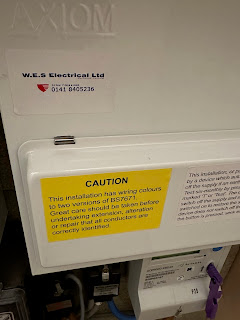 |
| EICR GLASGOW |
Understanding Electrical Rewire Work in Glasgow
In Glasgow, ensuring electrical safety is paramount for property owners, tenants, and businesses. Electrical rewire work plays a critical role in maintaining this safety by replacing outdated or hazardous electrical systems. This article will discuss the importance of rewiring, how it impacts property owners in Glasgow, and provide guidance on best practices.
Why Electrical Rewiring Is Necessary
Electrical wiring ages over time and can become inefficient or dangerous. Inadequate wiring presents various hazards, including the risk of electrical fires, electrical shocks, and malfunctioning appliances. Here are some reasons why rewiring becomes necessary:
Age of Wiring: If a property's electrical wiring is more than 25-30 years old, it's likely to be out of date with current safety standards and at higher risk of failure.
Visible Signs of Wear: Outlets or switches that spark, discoloration around sockets, or persistent burning smells indicate that the wiring needs attention.
Frequent Electrical Issues: Regularly tripping circuit breakers or blown fuses point to an overburdened electrical system.
Property Renovations or Extensions: Rewiring is often required to accommodate increased power demands or meet modern regulations.
Compliance with Regulations: Rewiring ensures the property adheres to current electrical codes and standards, which is crucial for safety certifications.
The Process of Electrical Rewire Work
Rewiring is a complex job involving the replacement of all wiring, sockets, switches, and consumer units. The process generally includes:
Initial Inspection: Qualified electricians inspect the existing wiring system to assess the current condition and identify what requires replacement.
Preparation and Planning: Detailed plans are drawn up to minimize disruptions and maximize efficiency. This step includes identifying the best routes for new wiring, especially if the property is already occupied.
Removing Old Wiring: The electrician carefully removes old wiring and makes space for new installations. This may require cutting through walls, floors, or ceilings.
Installing New Wiring: The new electrical system, including cables, switches, sockets, and consumer units, is installed according to modern standards.
Testing and Certification: Once the installation is complete, comprehensive testing is done to ensure the system's safety and functionality. The electrician then provides an Electrical Installation Certificate to confirm compliance with regulations.
Hiring a Qualified Electrician in Glasgow
Choosing the right electrician is crucial to ensure quality rewiring work. Here are some tips for selecting a qualified professional in Glasgow:
Check Accreditation: Make sure the electrician is registered with a recognized accreditation body such as NICEIC, SELECT, or NAPIT. These certifications ensure the contractor adheres to strict safety standards.
Ask for References: Request references from previous clients or look for customer reviews to assess their reliability and quality.
Get Multiple Quotes: Compare quotes from several electricians to ensure you receive competitive pricing and high-quality service.
Detailed Contracts: Ensure the contract includes a detailed breakdown of the work, costs, and timelines.
Post-Completion Support: Clarify if the electrician provides follow-up support or maintenance once the rewiring is complete.
Cost and Considerations
Rewiring a property in Glasgow can be a significant investment, but it's crucial for safety. Costs vary based on several factors:
Property Size and Age: Larger properties or older buildings with outdated wiring systems may require more extensive work, increasing costs.
Extent of Rewiring Required: Whether the entire property needs rewiring or only specific circuits will impact the overall cost.
Accessibility: Wiring in hard-to-reach areas or properties with unique architectural features may require additional labor and materials.
Regional Costs: Costs may also vary based on regional factors like local demand and availability of qualified electricians.
Best Practices for Property Owners
Plan Ahead: Schedule rewiring work well in advance to minimize disruptions to daily life. If tenants occupy the property, coordinate with them to ensure access and reduce inconvenience.
Allocate a Budget: Rewiring costs can be substantial. Set aside a budget to cover unexpected expenses.
Maintain Electrical Records: Keep records of the rewiring work, including testing and certification, for future reference or potential inspections.
Stay Informed: Be aware of current regulations and standards that apply to rewiring. This knowledge will ensure your property remains compliant.
Conclusion
Electrical rewire work is vital for ensuring the safety and reliability of electrical installations in Glasgow properties. By understanding the process and working with qualified professionals, property owners can maintain safe living and working environments. Investing in rewiring improves property value, reduces liability risks, and provides peace of mind.
 |
| EICR Westend Glasgow |

